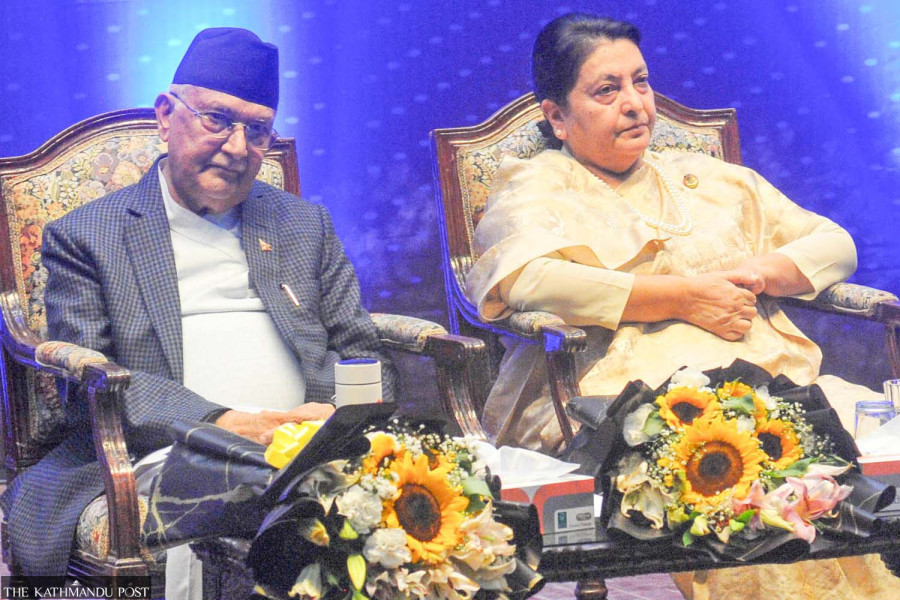National
Bhandari’s return sparks leadership row in UML
As leaders close to Oli warn against behaviour contrary to official decisions, rivals believe differences will be settled amicably.
Post Report
The leadership row in the CPN-UML is deepening and the “politics of negation” has intensified after former President Bidya Devi Bhandari announced her return to the party.
Her comeback is seen as a serious challenge to KP Sharma Oli, who, despite some reservations from senior party leaders, has made public his plan to contest for party chairperson for a third consecutive term.
The Oli faction keeps downplaying Bhandari’s return to party politics, possibly as a successor to Oli. However, leaders close to Bhandari say the UML needs new leadership to overhaul the party. Oli faces allegations of weakening the party, which Bhandari can potentially strengthen.
Leaders outside the UML have also expressed concerns over her return to active party politics. In a recent meeting between Oli and Nepali Congress President Sher Bahadur Deuba, Bhandari's return to party politics was discussed. Deuba reportedly expressed his reservations over her return to the party after holding the coveted state position for two terms.
On Thursday, the row within the UML was exposed in a subtle way. Senior leaders supporting Oli urged the party’s rank and file not to discuss matters related to leadership. Another debate between Oli’s and rival factions is whether the two-time party chair should be allowed to contest for a third term. Besides, Oli is already past the 70-year moratorium for a leadership candidate.
Oli's trusted lieutenant and party general secretary Shankar Pokhrel said on Thursday that commenting on the statute approved by the general convention would lead to organisational anarchy.
There is controversy within the UML over amending the party statute that prohibits holding the same position for more than two consecutive terms.
By calling a meeting of office-bearers and leaders in charge of the party's sister organisations, Pokhrel instructed them to check organisational anarchy.
Pokhrel claimed that the party’s 10th general convention had removed the retirement mandate after 70 years and the bar on leaders from continuing in the same post for two consecutive years.
Some leaders close to Bhandari such as senior vice-chairman Ishwar Pokhrel, Standing Committee member Karna Thapa and others have opposed the claim by the Oli faction saying that the decision was only a temporary arrangement, not a long-term provision.
“Some provisions finalised by the general convention are later amended by the national convention based on the needs of the time,” Pokhrel, the party general secretary, said. “As a representative to both conventions, approving such provisions oneself and then questioning them now is unethical.”
Pokhrel directed party members to resist what he described as indiscipline and anarchy, saying that making public comments on decisions passed by the national convention is a sign of disorder and a lack of discipline.
He warned that such anarchy spreading within the party and organisation is unforgivable and cautioned against any form of disobedience to the party’s declared policies.
The party has called separate meetings of the Politburo and central committee from next week where an age bar and the third consecutive leadership terms will be discussed, according to party leaders.
The party is preparing to hold its policy convention from 5 to 7 September. The policy convention is crucial as it will not only discuss ideological, political and organisational issues but will also lay the ground for the leadership election.
The Oli faction wants to stop Bhandari and carry Oli’s chairmanship over to the third term. However, Bhandari has already made her move and is meeting leaders across the party line. Determined, she is making up her mind to give a tough challenge to Oli, a leader close to Oli said.
Particularly after Oli and his lieutenants started making critical remarks against her, Bhandari is more committed to contesting the party chair, insiders say. Yet, some UML leaders believe Oli will hand over the party’s baton to her.
In a similar vein, UML Standing Committee member and head of the party’s sister organisations department Bhanu Bhakta Dhakal has warned leaders and cadres not to speak against the party’s decisions.
He said that some office-bearers of sister organisations were being watched for going against the party's institutional decisions.
“There are some office-bearers and leaders who seem to believe that it’s okay to ignore institutional decisions. This kind of behaviour is on the party’s radar.”
Anand Pokharel, a Politburo member, toes a middle path in the UML. “We now need to start a fresh discussion in the party on these issues and take a decision at the policy convention,” he said.
“I don't think Oli and Bhandari will contest against each other, they will reach an understanding,” Pokhrel said. “The leader will be decided through mutual consultation. We will pick our leader unopposed and without dispute.”




 10.12°C Kathmandu
10.12°C Kathmandu














